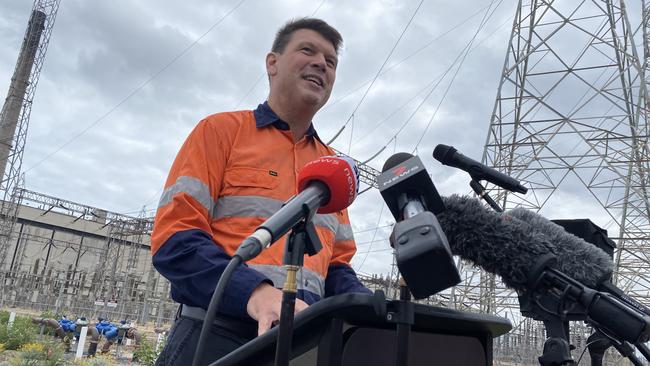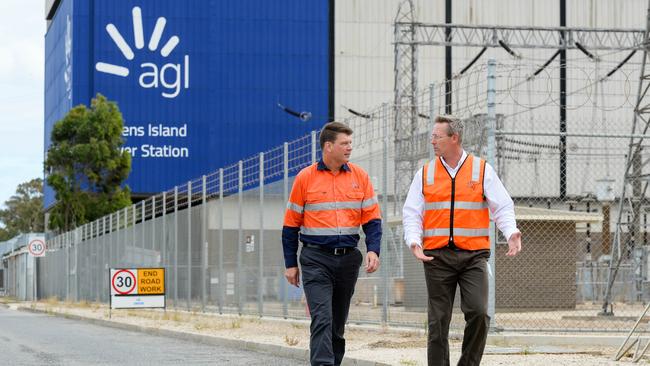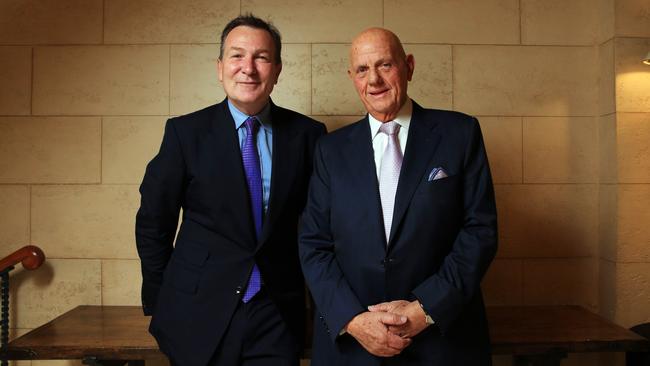
The company won’t say what the news will be next week but the market is betting on a split as AGL markets itself as a green energy company with a coal-fired cousin.
Redman has been doing a lot of housework leading up to the big day with this week’s venture being two battery announcements, one at Torrens Island on the fringes of Adelaide and earlier a development battery prospect in Yallourn.
The $175m Adelaide battery is smaller than originally flagged with just an hour’s storage but that reflects the company’s latest plans to use batteries for as little as 15 minutes as backup power.
Earlier this month Redman hit the news with more commercial solar plans.
Last week was the key Alcoa deal, with AGL managing to wind back its commitment to just over 50 per cent of the five-year deal, with Alinta taking on around 12 per cent and Origin the rest.
Since that deal AGL’s stock price increased over 10 per cent before falling 1.2 per cent to $10.34 on Wednesday.

The Alcoa deal was welcomed by the market including AGL’s reduced commitment but the rumoured corporate action has also buoyed the market.
The stock price has fallen from $23.22 in May 2019 so has some catching up to do, which of course is the rationale for the split to showcase the “real” value in AGL.
The split as floated would be along the lines of several power companies in Europe splitting coal-fired generation from renewables and customer operations.
The model is not new for AGL, which some years ago split its network business from generation.
The company has also not been afraid of chasing the latest fad as shown by $1.9bn in write downs on what are now dud wind power contracts.
When the contracts were written several years ago the company was chasing a solar expansion and reported huge development profits so it’s all a bit like a ferris wheel.
The market will be keen on some policy certainty.
A market in transition
Redman is like many in the market adapting to the reality that the energy industry is in transition.
His new structure will be aimed to better reflect AGL’s well-placed position in that market.
BP’s local boss Frederic Baudry outlined his company’s position at a Melbourne luncheon for the British Chamber of Commerce on Wednesday.
Baudry talked up Australia’s position, saying, “it has access to abundant renewable energy sources. There is clear alignment on the importance of the energy transition between major customers and a global energy provider like BP.
“There’s a strong appetite from local and global investors to support green energy.”
He cited the company’s partnership with Qantas, noting “it was the first airline to announce capping its net emissions at 2020 levels, and in 2019, the second to commit to net zero emissions by 2050”.
Qantas already operates the largest carbon offset program in aviation globally with 11 per cent of flights booked being offset in projects including onshore and offshore wind, bioenergy, solar power, and more recently hydrogen.
BP, Baudry said, would double the size of its customer-facing business in the next 10 years, and invest $US5bn a year over the next decade to scale its low-carbon electricity and energy businesses.
BP last year closed its Kwinana refinery, and in a blow to Energy Minister Angus Taylor’s ill-fated policy Ampol is widely tipped to be closing its Lytton refinery in Brisbane.
This will mean Viva’s Geelong refinery will be the last one standing should it survive.
The decisions are based on simple economics but instead Baudry noted the Kwinana facility was well positioned as both an import terminal and to handle new energy like hydrogen.
He said BP was seeking early positions in hydrogen and carbon capture and storage.
It also planned to double capital investment in digital to around $US1.5bn per annum out to 2025.
The bottom line globally was that present policies were simply not enough.

Solly’s succession
Solly Lew and Mark McInnes have combined to produce record earnings for Premier Investments but the question is what happens now with McInnes scheduled to leave late this year.
Succession is the big issue for the company.
The 76-year-old Lew, who enjoyed his birthday on Monday, must decide whether to replace McInnes or have him on the sidelines to return full time in three years when his children are older.
His notice period runs until January next year but whether he hangs around long after August remains to be seen.
The Premier board must decide in the next few weeks whether to trigger a two-year non-compete clause that would deliver him $2.8m a year for the next two years.
That would suit McInnes who would be happy to stay involved on a more flexible basis in the interim but it remains to be seen what Lew plans.
The way things stand, Wednesday’s results presentation may be the last one for McInnes and true to form it was a stunner, with earnings up 89 per cent to $188.2m on a 72 per cent increase in sales to $784.6m.
Online sales stand at 20 per cent of the group total and in the first seven weeks of the year like-for-like sales are up 32 per cent.
This shows as Malaysia and Europe open up Premier is poised to maintain investment.
There are a couple of things the retail team has done well including building its own distribution centre, which has meant increased online sales have not hit margins.
In the last year in the middle of the pandemic the team invested big in inventory which meant as the economy opened the stores had plenty of goods and importantly the right sort of goods.
By ordering at the right time the extra inventory has not affected stock cycles so the changes made at Premier have had zero supply chain problems.
At $23.84, up 2.6 per cent, the stock is trading at five-year highs.
The question then is what happens next.
Lew was asked about succession in the analyst call but he was non committal.
McInnes is adamant he wants to spend time with his children for the next couple of years but has no plans to retire.
As things stand his turn up to work pay is $2.8m and between now and his expected departure in late August he will be on paid leave.
But the question is what happens for the next couple of years with McInnes making clear he wants a break, especially around the peak Christmas time.
Solly talks about the value of having talent merchants and McInnes is first class.
Peter Alexander boss Judy Coomber and Smiggle boss John Cheston clearly qualify but would Lew want to take them away from their own stores to run the group?
Decisions have to be made soon and until they are succession remains the elephant in the room for Premier.







AGL boss Brett Redman is doing his very best to signal a corporate split next Tuesday when he gathers analysts for his strategy day.